- Quick Read
- Deep Read ( 5 Min. )

Why is Christian Science in our name?
Our name is about honesty. The Monitor is owned by The Christian Science Church, and we’ve always been transparent about that.
The Church publishes the Monitor because it sees good journalism as vital to progress in the world. Since 1908, we’ve aimed “to injure no man, but to bless all mankind,” as our founder, Mary Baker Eddy, put it.
Here, you’ll find award-winning journalism not driven by commercial influences – a news organization that takes seriously its mission to uplift the world by seeking solutions and finding reasons for credible hope.
Explore values journalism About usIn Today’s Issue
- Democrats move fast to try to strengthen Harris
- Today’s news briefs
- From Pennsylvania to Capitol Hill, a push for answers on Secret Service lapse
- Why teen summer jobs have made a comeback
- Civil war drove them to Nigeria. Cameroonians say they feel at home.
- Bullfighting bans, domestic violence protections
Monitor Daily Podcast
- Follow us:
- Apple Podcasts
- Spotify
- RSS Feed
- Download
TODAY’S INTRO
Biden exits, seeking more time to wash his Trans Am
 Mark Sappenfield
Mark Sappenfield
My fondest memory of Joe Biden comes from The Onion. For a time during Mr. Biden’s vice presidency, the satirical website cast him as the mortifying but lovable everyman in the White House. “Shirtless Biden Washes Trans Am In White House Driveway” was one classic.
But as with many things, The Onion perceived something deeper. Somewhere between gaffe-prone and refreshingly honest, the vice president was someone to whom we could all relate.
With his withdrawal from this year’s presidential race, the coming months will mark his coda in American politics – 50 years of service. It is not the way he might have wished. But as our editorial today beautifully states, Mr. Biden’s career has always been a study in success tempered by disappointment. His exit only underlines the humility he has gained along the way.
Share this article
Link copied.

Help fund Monitor journalism for $11/ month
Already a subscriber? Login

Monitor journalism changes lives because we open that too-small box that most people think they live in. We believe news can and should expand a sense of identity and possibility beyond narrow conventional expectations.
Our work isn't possible without your support.
Democrats move fast to try to strengthen Harris
Democrats are energized, with party leaders lining up to endorse Vice President Kamala Harris, and campaign cash is pouring in. But time is short, and they face an uphill battle.

One day after President Joe Biden rocked the world by dropping his reelection bid, the Democratic Party appeared to be swiftly coalescing around Vice President Kamala Harris. Prominent Democrats – governors, senators, former House Speaker Nancy Pelosi – offered endorsements. On Monday, the Associated Press reported that Ms. Harris now has the support of more than half of the Democratic convention delegates needed to clinch the nomination.
Democratic anxiety remains high that former President Donald Trump could return to power, but there’s a fresh wave of hope that Ms. Harris can salvage her party’s prospects in November.
Still, the task is daunting. Ms. Harris ran a famously inept presidential campaign in the 2020 cycle and has had high-profile stumbles as vice president. She will own the Biden record, not popular with the public, as well as a portfolio of tough issues and memes that mock her laugh and other awkward public moments.
And time is running out. The Democratic National Convention begins in four weeks, and the party is playing catch-up.
“She better figure it out fast, because she and her team are about to get hit with everything but the kitchen sink – and probably that, too,” says Jim Manley, a veteran Democratic consultant.
Democrats move fast to try to strengthen Harris

Less than 24 hours before President Joe Biden rocked the world by dropping his reelection bid, about 100 progressive activists gathered in front of the White House to call on the president to “pass the torch.”
It was time, they made clear, for the older president to do what he had said he’d do early in 2020: serve as a “bridge” to the next generation, strongly implying he’d serve just one term.
“Wide swaths of the Democratic Party” shared concerns about Mr. Biden, Quentin Colón Roosevelt, the 20-year-old great-great-great-grandson of President Teddy Roosevelt, told the crowd.
Now that Mr. Biden is out, Democratic anxiety remains high that former President Donald Trump could return to power, but there’s also a fresh wave of hope that Vice President Kamala Harris can salvage her party’s prospects in November.
The task is daunting. Ms. Harris ran a famously inept presidential campaign in the 2020 cycle and has had high-profile stumbles as vice president. She will own the Biden record, not popular with the public, as well as a portfolio loaded with tough issues (starting with the root causes of illegal immigration) and memes that mock her laugh and other awkward public moments.
“At this point, it’s still Donald Trump’s election to lose,” says Sherry Bebitch Jeffe, a Los Angeles-based political analyst.
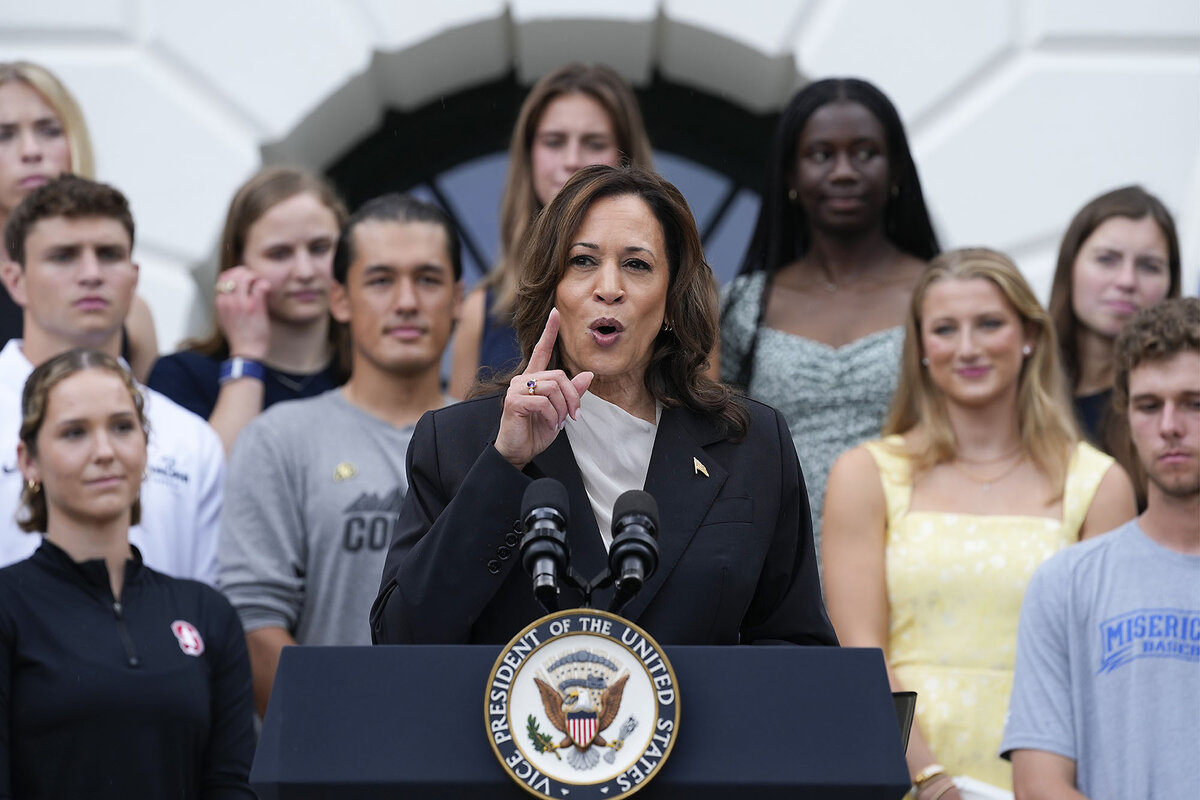
Now, after Mr. Biden’s dramatic announcement, followed shortly by his endorsement of Ms. Harris for the Democratic nomination, the party has begun to coalesce around her. On Monday, the Associated Press reported that Ms. Harris now has the support of more than half of the Democratic convention delegates needed to clinch the nomination.
Prominent Democrats – governors; senators; former President Bill Clinton and his wife, 2016 nominee Hillary Clinton – have one by one endorsed Ms. Harris. On Monday, former House Speaker Nancy Pelosi, a key voice in the delicate effort to persuade Mr. Biden to step aside, threw her support behind the vice president. An exception, former President Barack Obama, has raised eyebrows by not endorsing Ms. Harris, instead calling for an open nomination process. His reported goal is to remain above the fray, avoiding the appearance of a Harris coronation.
Indeed, Republicans are already arguing that Ms. Harris’ seeming anointment is undemocratic, that it has negated the voices of the 14 million Americans who voted for Mr. Biden in the primaries. But, Democrats say, Ms. Harris is Mr. Biden’s obvious successor, and to bypass her – a Black, South Asian woman – would alienate critical segments of the Democratic base.
The reality, too, is that time is short. The Democratic National Convention begins in four weeks, and the party is playing catch-up. Ms. Harris trails Mr. Trump in head-to-head matchups by a bit less than Mr. Biden did – 2 percentage points on average versus a 3-point deficit for the president, according to The New York Times. And the GOP attacks on Ms. Harris are only getting started.
“She better figure it out fast, because she and her team are about to get hit with everything but the kitchen sink – and probably that, too,” says Jim Manley, a veteran Democratic consultant.
A key, he says, will be to avoid the kind of infighting and leaks that dogged Ms. Harris’ 2020 presidential campaign, as well as her tenure as vice president. Things settled down after the arrival of veteran Democratic operative Lorraine Voles as her chief of staff in 2022.
The newly minted “Harris for President” campaign effectively inherits the massive Biden-Harris campaign apparatus. She’ll have her own inner circle of advisers, including sister Maya Harris, but she can’t match Mr. Biden’s own “kitchen cabinet” for its decades of experience – spanning all or most of the president’s 52 years in politics.

Still, Ms. Harris’ sudden ascension brings a burst of energy to a campaign that had been consumed for weeks by Mr. Biden’s visible struggles with sharpness – a decline that became painfully evident in his disastrous debate against Mr. Trump a month ago.
Recent reluctance to donate to the Biden campaign has given way to a burst of giving. In the 24 hours since Mr. Biden left the race, the Harris campaign says it has raised $81 million - the highest 24-hour “raise” of any candidate in history, the campaign says.
Ms. Harris’ all-but-certain rise to the Democratic presidential nomination has also energized her most fervent core of supporters, Black women – often described as the backbone of the Democratic Party.
On Sunday evening, a group called Win With Black Women held a three-hour call with 44,000 participants and raised more than $1.6 million for the Harris campaign.
One group member, Democratic strategist Karen Finney, says it’s clear from the vice president’s statement Sunday that “she’s very aware of the importance of earning this, and not having it be a coronation.”
“She was on the phone yesterday, calling delegates, putting in the work,” says Ms. Finney.
On Monday, Ms. Harris paid tribute to the president in her first public remarks since Mr. Biden dropped out of the race. Speaking from the South Lawn of the White House to celebrate the 2023-2024 NCAA championship teams, Ms. Harris praised the qualities “that I have seen every day in our president: his honesty, his integrity, his commitment to his faith and his family, his big heart, and his love – deep love – of our country.”
Ms. Harris now faces the high-stakes task of selecting a running mate. Three Democratic governors have figured prominently in speculation – all white men from states seen as reflecting mainstream American values: Josh Shapiro of Pennsylvania, one of three must-win battleground states for the Democratic ticket; Andy Beshear of solid-red Kentucky; and Roy Cooper of North Carolina, another electoral battleground. Sen. Mark Kelly of Arizona, a former astronaut from another battleground state, is also getting mentions.
Between now and Election Day, Ms. Harris will face the most intense public scrutiny in a political career that has taken her from San Francisco district attorney, California attorney general, and U.S. senator to vice president. Her public approval ratings have typically come in even lower than Mr. Biden’s, and it may not be easy for her to recraft her image.
With Mr. Biden now set to retire at the end of this term, his party’s task is to establish the strongest record possible for his successor nominee.
For Ms. Harris, it will be trial by fire, with little time to hone her skills on the stump before voters start casting ballots.
In the words of veteran Democratic strategist Peter Fenn: “We’re now moving at lightning speed after moving at glacial speed.”

Today’s news briefs
• Gaza evacuation order: The Israeli military has ordered the evacuation of part of a crowded area in Gaza that it had designated a humanitarian zone.
• Netanyahu to Washington: Israeli Prime Minister Benjamin Netanyahu flies to Washington, where he will address a joint session of Congress on Thursday.
• Bangladesh unrest: Bangladesh’s top court scales back a controversial quota system for government job applicants after it led to nationwide unrest and deadly clashes between police and protesters that have killed at least 139 people.
• Migrant caravan: Hundreds of migrants from around a dozen countries leave from Mexico’s southern border on foot in an attempt to make it to the U.S. border.

From Pennsylvania to Capitol Hill, a push for answers on Secret Service lapse
Security lapses that enabled the July 13 shooting of former President Donald Trump are raising larger questions about Secret Service protection – prompting bipartisan calls today for the director’s resignation.

- Quick Read
- Deep Read ( 9 Min. )
-
Christa Case Bryant Staff writer
When Zach Scherer arrived the night before former President Donald Trump’s July 13 rally in Butler, Pennsylvania, to look at preparations, he was stunned that he could drive his truck onto the grounds and park by the stage.
Most of the other 20 rallies he’d been to were locked down 36 hours in advance. “I wasn’t searched; I wasn’t vetted. I could have planted any type of device.” He says he raised his concerns with organizers.
On Monday, Congress held the first of what will likely be many hearings to try to piece together how a lone shooter got so close to assassinating a former president. The egregious lapse, which resulted in the first shooting of a current or former president in more than 40 years, prompted both Democrats and Republicans to call for the resignation of Secret Service Director Kimberly Cheatle.
But simply firing Ms. Cheatle without methodically piecing together what went wrong at the tactical level will not solve the problem, says Steven Rotkoff, a retired U.S. Army colonel who runs his own company helping organizations game out their security planning. And it shouldn’t be partisan, he stresses. “Everybody should be invested.”
From Pennsylvania to Capitol Hill, a push for answers on Secret Service lapse
Preparations were in full swing for former President Donald Trump’s rally at the Butler Farm Show grounds when Mitchel Delullo pulled up with two giant cranes.
As he hoisted a massive U.S. flag, the rental equipment provider and Trump supporter felt proud to be a part of something bigger than himself. The event ended up being big in a way he never could have imagined.
The next day, Mr. Delullo was in the crowd behind Mr. Trump when shots rang out.
What followed nearly altered the course of a historic election season. The July 13 shooting – which injured Mr. Trump’s ear, killed a former fire chief, and put two other rallygoers in the hospital – has also let loose an avalanche of finger-pointing and recriminations.
On Monday, Congress held its first hearing to try to piece together how a lone shooter got so close to assassinating a former president under protection by the Secret Service. The egregious lapse, which resulted in the first shooting of a current or former president in more than 40 years, has left even eyewitnesses incredulous.
“I was there, and I’m still trying to figure out the truth,” Mr. Delullo says. “A 20-year-old kid with no military experience was able to outsmart one of the smartest teams in the world.”
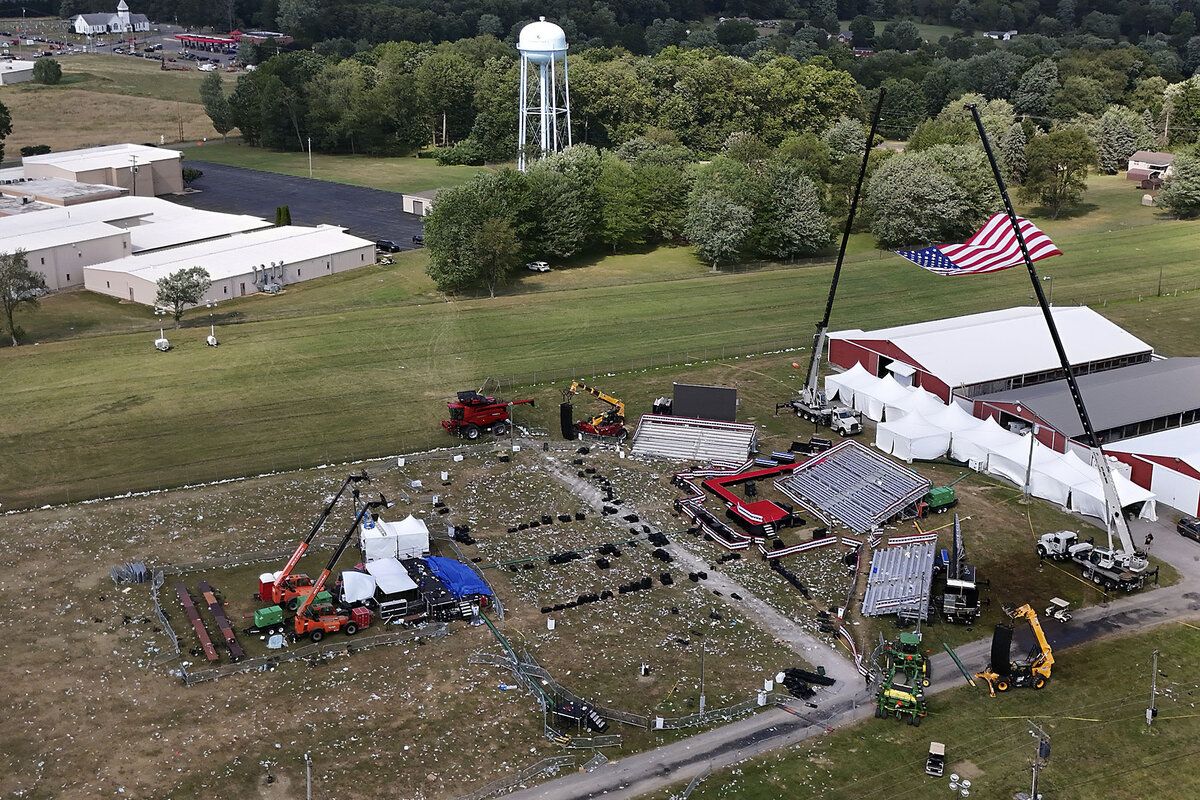
The shooter positioned himself on an unpatrolled roof within easy rifle range of the stage where Mr. Trump would appear. The roof, despite offering a high vantage point and clear line of sight to the stage, was deemed outside the security perimeter of the event. According to Secret Service Director Kimberly Cheatle, the shooter was about 200 yards away from the former president. Yet his AR-15, a weapon commonly used in U.S. mass shootings over the past 15 years, had a range of 400 to 600 meters.
Questions range from the motives of the shooter (still unknown) to the security planning, staffing, and performance of the Secret Service and local law enforcement. Most pressing is why the roof was not patrolled and why Mr. Trump’s detail allowed him to take the stage despite numerous red flags.
Ms. Cheatle, who complied with a subpoena to appear before the House Oversight committee Monday morning, has taken the most heat. The agency has a $3.1 billion annual budget, 8,000 personnel, and a “zero-fail” mission. Yet even by her admission, it failed July 13.
Director Cheatle faced a bipartisan grilling at Monday’s hearing. Ranking member Jamie Raskin called the near assassination of Mr. Trump a “stunning security failure” in his opening remarks. By the end of the hearing, during which it became evident Ms. Cheatle had failed to regain the confidence of lawmakers by demonstrating transparency and cooperation, Mr. Raskin joined Republican Chair James Comer in urging her to resign.
Ms. Cheatle resigned the following morning.
But simply removing Ms. Cheatle without methodically piecing together what went wrong at the tactical level will not solve the problem, says Steven Rotkoff, a retired U.S. Army colonel who runs his own company – Red Team Rotkoff – helping organizations game out their security planning.
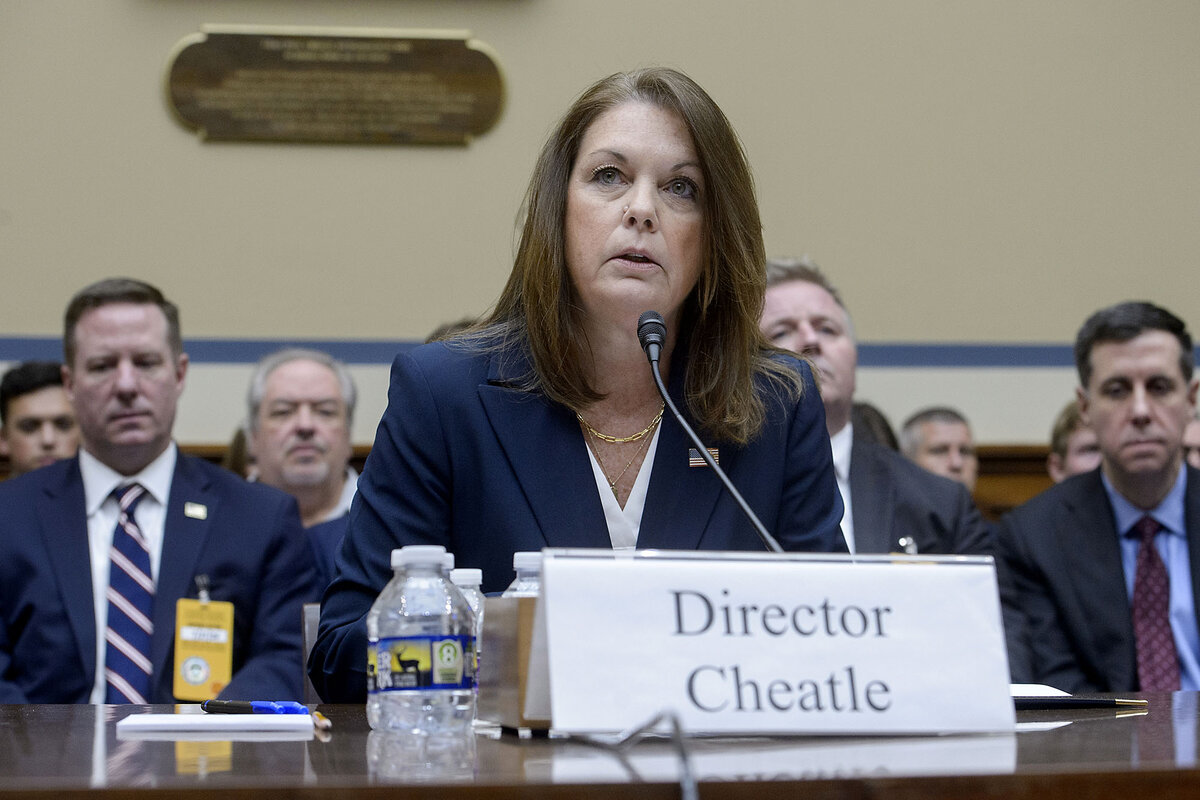
“If all they do is crucify her, then the system has failed and the Secret Service has failed,” says Mr. Rotkoff, who served on a commission recommending security improvements to Congress after the Jan. 6, 2021, Capitol riots.
At stake, he says, is not only protecting presidents but also ensuring that security concerns do not significantly narrow the field of politics.
“If we cannot do a good job of guaranteeing security of the people who run for office in America, then quality people will not run,” he says, underscoring the need to keep any investigations nonpolitical. “Everybody should be invested.”
Local views of a vulnerable venue
Butler County, a mostly white, working-class area north of Pittsburgh, dotted with churches and fading mid-century homes, is a Trump stronghold in a key swing state. Mr. Trump rallied in Butler just days before the 2020 election and won the area with 66% of the vote despite losing the state to Joe Biden. That rally took place at the local airport, which was unavailable this time because of a previously planned event.
The piercing of a protective wall for a major U.S. candidate hit particularly hard for local Trump rally volunteers.
Butler County Emergency Management Director Steven Bicehouse was about 40 yards from Mr. Trump, tending to a heat-stricken attendee, when the shots rang out.
“We very quickly changed gears and treated the gunshot victims immediately,” says Mr. Bicehouse, saying he had limited interaction with Mr. Trump’s planning team. “We didn’t have time for emotion until later when the job was done.”
This weekend, dozens of survivors regrouped at the Snack-n-Pack restaurant in Butler to discuss what happened. Among them was Zach Scherer, a firefighter from nearby Chicora, Pennsylvania, who has been to some 20 Trump rallies and has visited the former president at Mar-a-Lago.
When Mr. Scherer arrived on Friday evening to look at preparations, he was stunned that he was able to drive his truck onto the grounds and park by the stage. Most events, he says, are locked down 36 hours before anyone takes the stage. “I wasn’t searched, I wasn’t vetted, I could have planted any type of device.”
The venue, he adds, was a poor choice, estimating that it has “probably 20” entrances. “There’s no way in hell to lock down that entire place,” he says.
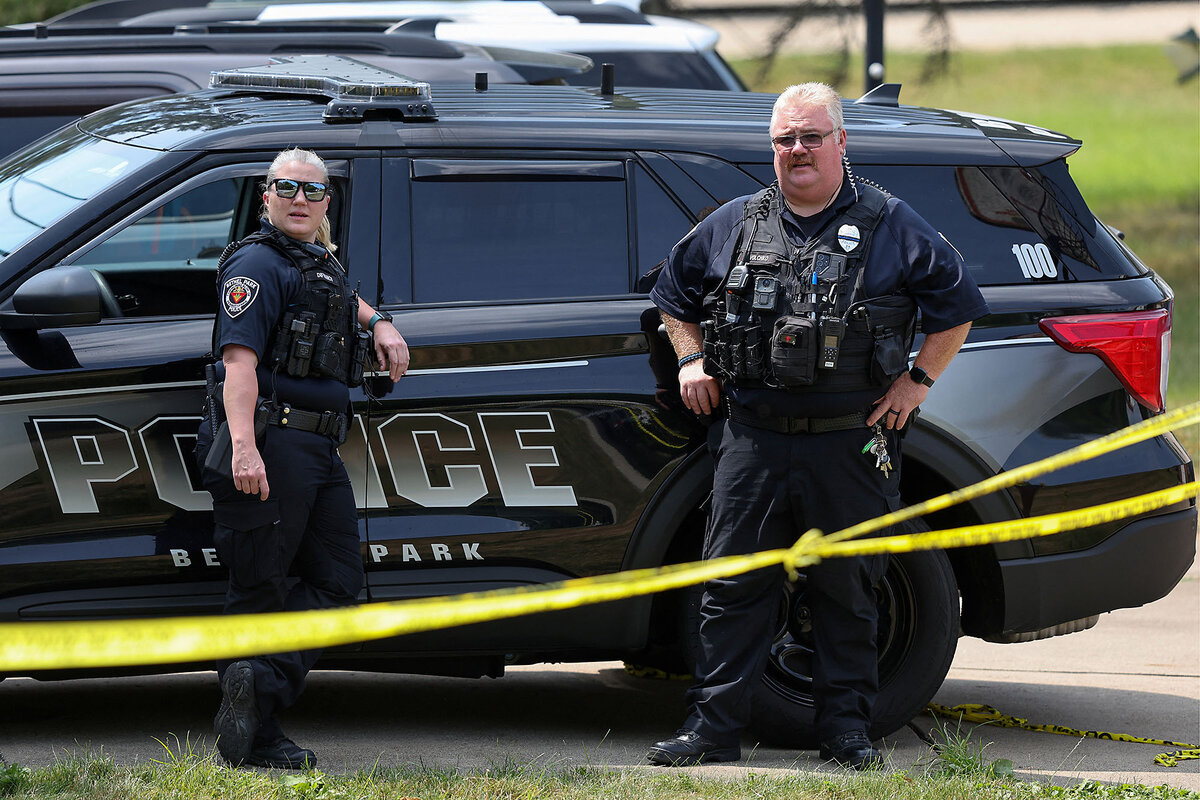
Mr. Scherer also noted the lack of what he had seen at other Trump events – a private security team. He says he raised his concerns to organizers.
“There are so many questions. I don’t know whether it falls back on the state party, on the organizational side of things, or whether it falls back on federal law enforcement,” he says. “And then everyone you talk to is saying our local police were responsible for outside the perimeter. There are so many fingers being pointed.”
Gaps in security at Butler rally
Director Cheatle had said in an interview with ABC News that local law enforcement were responsible for the building where the shooter perched, though she clarified at the hearing that none of her comments should be construed to blame them.
Local officials, for their part, have said they informed the Secret Service two days before the rally that they didn’t have the staffing to cover that rooftop.
One local law enforcement agent, speaking on condition of anonymity because he didn’t have authority to speak publicly, confirmed to the Monitor that local police had a limited role. He said the two officers who were able to confront the shooter moments before he fired had been pulled off traffic duty to look for a suspicious man who had been reported.
His name was Thomas Matthew Crooks of Bethel Park, a Pittsburgh suburb where school district officials said he “excelled academically” and generally got along with others. He went on to get an associate’s degree in engineering. “He was extremely intelligent,” says Kev Man, who runs a Pittsburgh hot sauce company and whose son attended high school with the shooter.
According to Butler officials, one of the local police officers made eye contact with Mr. Crooks after getting hoisted up to the roof’s edge but then, after the shooter pointed his gun at him, let go – falling and hurting his leg. Butler County Sheriff Mike Slupe has hailed that man as a hero who potentially saved Mr. Trump’s life by distracting the shooter.
No law enforcement personnel were posted on that roof, though some were reportedly inside the building. Ms. Cheatle told ABC News that was because of the roof’s slope, though others have pointed out that counter-snipers were stationed on a steeper roof. She confirmed that a Secret Service agent killed the shooter almost immediately after he opened fire.
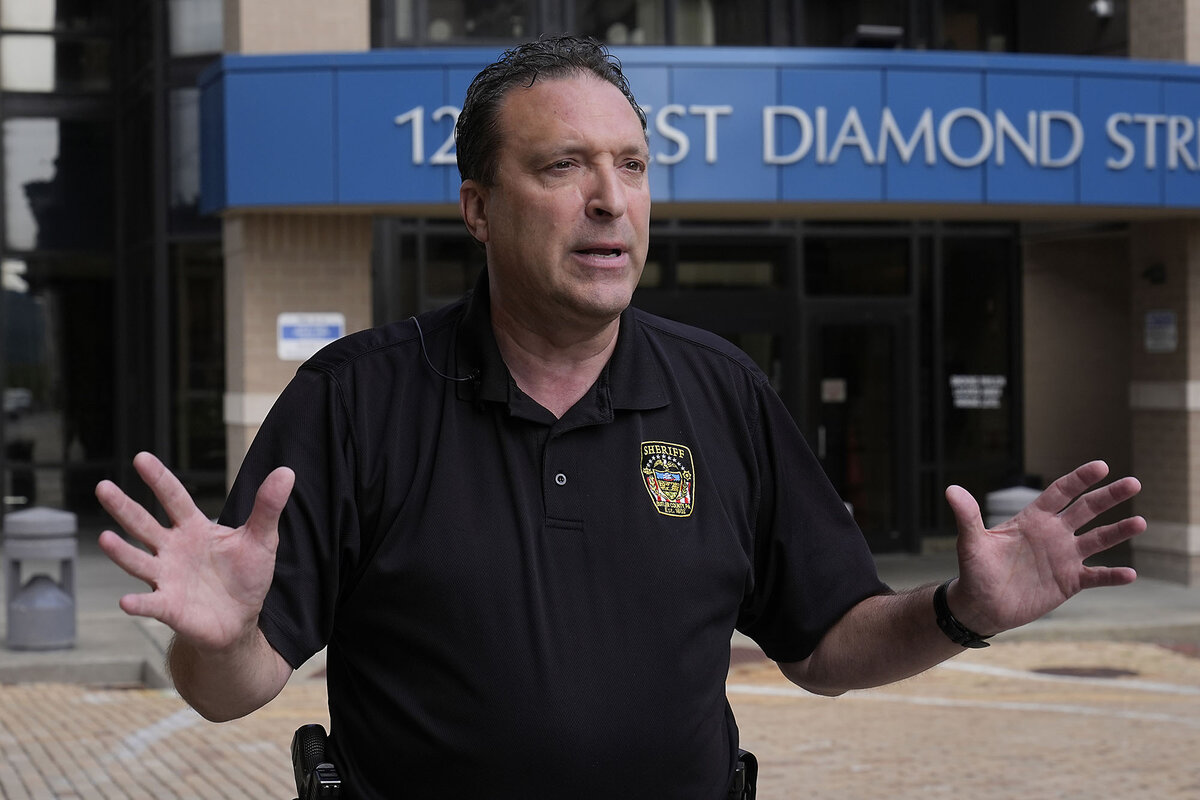
Over the past week, other key gaps in the event’s security have come to light. The shooter surveyed the area with a drone hours before the event, The Wall Street Journal reported. However, the Secret Service, which according to a 2023 government report employs drones to “create secure environments for protected people, places, and events,” reportedly did not use aerial surveillance.
The Secret Service had initially refuted claims that leadership had denied requests from Mr. Trump and his team for more protection, but the Washington Post reported Friday that the agency had in fact repeatedly denied such requests.
According to a July 20 letter to Director Cheatle from GOP Sen. Chuck Grassley of Iowa, Mr. Trump received only three Secret Service “post-standers” – agents assigned to specific posts at a venue – for his rally, which drew an estimated 20,000 people, according to a local GOP campaign aide. By comparison, First Lady Jill Biden received 12 in Pittsburgh the same day. Senator Grassley, known for his dogged investigations over 44 years in Congress, cited whistleblowers as his source.
Ms. Cheatle would not give specific numbers of how many agents were deployed to the rally, saying only that all “assets” requested by Mr. Trump’s team for that day were granted.
Time line and alleged communication failures
GOP Sen. Ron Johnson of Wisconsin, ranking member of the Senate Homeland Security Committee, has also investigated – reaching out to state and local officials, among others. His office’s interim report found that Secret Service did not attend a briefing with law enforcement the morning of the Butler rally, and communications were siloed among the various partner agencies.
Despite the difficulty in alerting all law enforcement simultaneously of a threat, Secret Service was notified of Mr. Crooks’ suspicious behavior with plenty of time to act, according to the report.

The sniper first observed Mr. Crooks at 5:10 p.m., just over an hour before the shooting; took at least two photos of him at 5:14 p.m., and then shortly after 5:30 p.m. sent a group text to other snipers and then reported to “command” at 5:41 the suspect’s appearance and possession of a range finder, which pinpoints the distance between shooter and target so sights can be set accurately.
By 5:59 p.m., 13 minutes before the shooting, local law enforcement had received confirmation that the Secret Service was aware of the alert, the report says. Democrat Rep. Melanie Stansbury of New Mexico said at the hearing they knew by 5:51 p.m. Yet Secret Service agents still allowed Mr. Trump to approach the stage at 6:03.
Mr. Trump told Fox News in an interview that will air in full Monday night that he was never alerted to a possible threat before taking the stage.
Bystanders shouted to law enforcement approximately two minutes before the shooting at 6:11 p.m. that there was a man with a gun crawling atop an unpatrolled roof within easy rifle range of the podium.
Throughout the Oversight hearing, Ms. Cheatle repeatedly drew a distinction between identifying a suspicious person and a threat, the latter of which occurred less than five minutes before the shooting.
Ms. Cheatle confirmed that it was a Secret Service agent who killed the shooter after he opened fire. She said there was “overwatch” of the roof, without specifying from where. She said the agency is putting together a comprehensive report so that she could identify exactly where the “gaps and failures” occurred.
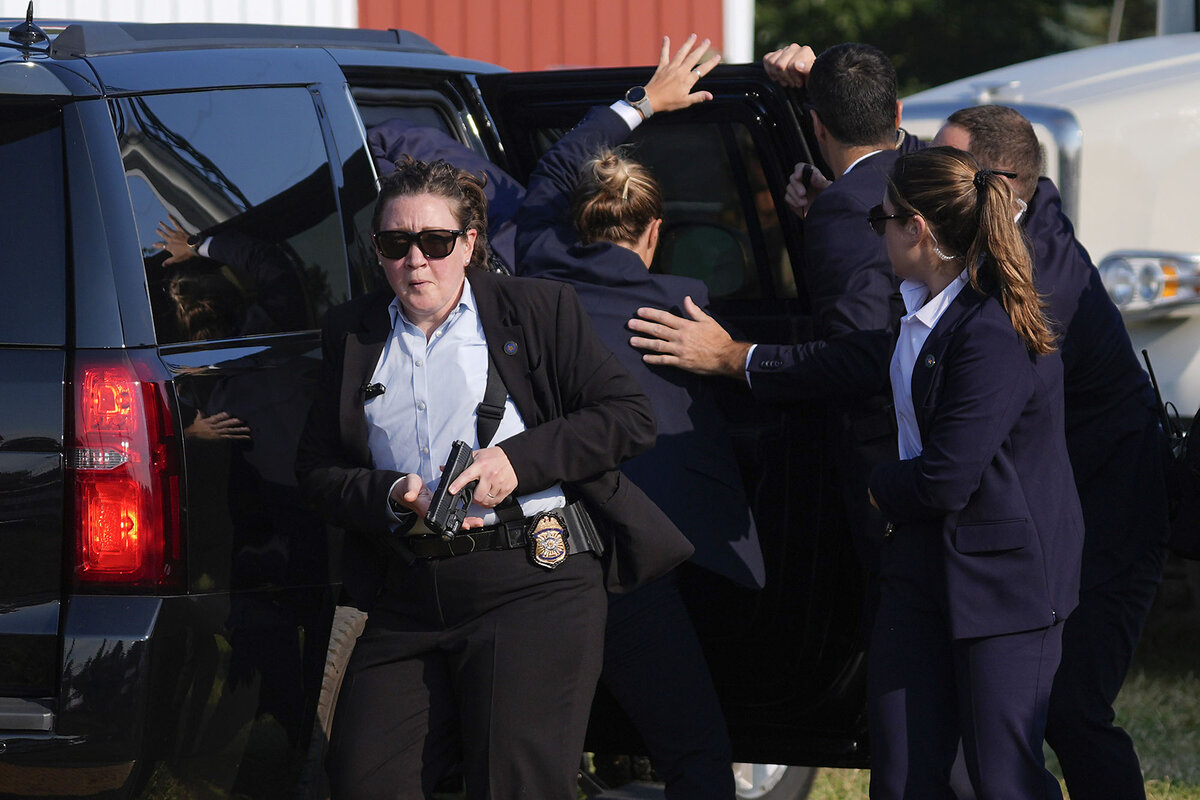
Bipartisan frustration with the Secret Service
The Department of Homeland Security has announced an independent panel to investigate what went wrong. U.S. lawmakers are also moving quickly to get answers.
While the Oversight committee was conducting its nearly five-hour hearing Monday, members of the House Homeland Security committee were in Butler touring the rally grounds ahead of a slated hearing on Tuesday.
Oversight committee members from both sides of the aisle grew agitated with Ms. Cheatle and her inability or unwillingness to answer basic questions.
GOP Rep. Michael Cloud of Texas said it was “very, very troubling” that Ms. Cheatle was unable to provide any answers, nine days after the shooting, about the “No. 1 question:” why the roof was left unpatrolled.
Ms. Cheatle said she expected results of an internal investigation within about 60 days, though she clarified she was not waiting for any reports before taking appropriate corrective measures.
Democratic Rep. Alexandria Ocasio-Cortez of New York said that timeframe was “unacceptable” given the heightened threat environment leading up to a consequential election, and the potential for a successful attack to spark more political violence.
“The stakes are too high,” she said.
Editor’s note: This story was updated to reflect Ms. Cheatle’s resignation on Tuesday, July 23.

Why teen summer jobs have made a comeback
Sacking groceries and scooping ice cream had been seen as a vanished rite of passage. But this year, the teen summer job is back in a big way.

- Quick Read
- Deep Read ( 7 Min. )
-
Oli Turner Staff writer
This summer, the share of teens working or looking for work hit a 14-year high – 38%, reversing a decades-long decline, according to the Bureau of Labor Statistics.
The return of teens to lifeguard stations, grocery checkout lines, and summer camps has benefits beyond the paycheck. In addition to learning CPR or how to run a social media campaign, teens interviewed talk about learning financial literacy, planning for their future, and feeling part of a community.
The benefits of a summer job can shape teens’ academic and social success, according to a 10-year study conducted by Northeastern University on Boston’s teen summer employment programs. Young people increase their aspirations to go to college, have higher GPAs, and less absenteeism in school.
The need to help at home is a primary motivation for teens seeking work. Consider Jayden Orr, 16, who just started at SummerWorks in Boston.
“The main thing that’s on my mind lately is my family,” says Jayden, “because I got to help my family out. That’s how the family’s gonna eat.”
Why teen summer jobs have made a comeback
Getting a summer job used to mean scooping ice cream at the mall or working the drive-thru at Burger King. Then came the Great Recession, followed by a rush for teens to spend their summers padding their college résumés with coding and language camps.
That changed again when the world closed for COVID-19, and then reopened. Not all adults returned to their jobs. The virtual ones came and went. Enter the teenage worker, who is back in a way not seen since “Twilight’s” Team Edward or Team Jacob was the only divisive topic.
The year before the pandemic, teens accounted for just over 2% of new hires, according to Gusto, a human resources and payroll company. In 2023, teens accounted for 20% of new hires. This summer, the share of teens working or looking for work hit a 14-year high – 38%, reversing a decades-long decline, according to the Bureau of Labor Statistics.
“Employers suddenly rediscovered teenagers as an important source of labor in the post-COVID economy, when adults realized they didn’t want to come back,” says Alicia Sasser Modestino, associate professor at Northeastern University, who has been surveying Boston’s summer employment program for nearly a decade.
The return of teens to lifeguard stations, grocery checkout lines, and summer camps has benefits beyond the paycheck, according to experts and the teens themselves. In addition to learning CPR or how to run a social media campaign, teens interviewed talk about learning financial literacy, planning for their future, and feeling part of a community.

Helping out the family
Consider Jayden Orr, 16, who just started in July at ABCD SummerWorks in Boston. His reason for getting a job is both pragmatic and profound.
“The main thing that’s on my mind lately is my family,” says Jayden, “because I got to help my family out. That’s how the family’s gonna eat.”
Zariyah Witherspoon, 17, also helps out her family, giving her mother $100 from her paychecks, the bulk of which she’s saving for college.
“I literally just save up my money because I’m leaving for college soon” says Zariyah. “And when I need to, I help my family. I give my mom $100 because, you know, why not? That’s my mom. I have to help around the house.”
Zariyah talks about growing up at the South Street Youth Center and finding her passion in the center’s boiler-room-turned-recording studio. As a 10-year-old, she helped replace the youth center’s floors and paint the walls a cheerful blue. She says the program and the mentorship she has received from her manager have helped her focus on her future.
“The studio did help me get in check and understand like, hey, if I want to do this for real, I have to fix my attitude and fix my act,” she says.
Jayden has been surprised at the immediate sense of community and the support he has gotten from the other teens. Already, he says, his co-workers feel like family.
The need to help at home is a primary motivation for teens seeking work, says Dr. Modestino.
“Nearly 70% of the young people in the summer jobs program are using some of their earnings to pay some kind of household bill. They’re helping pay rent, groceries, or utilities,” she says. “They’re paying for their own cellphone or their own clothes now.”
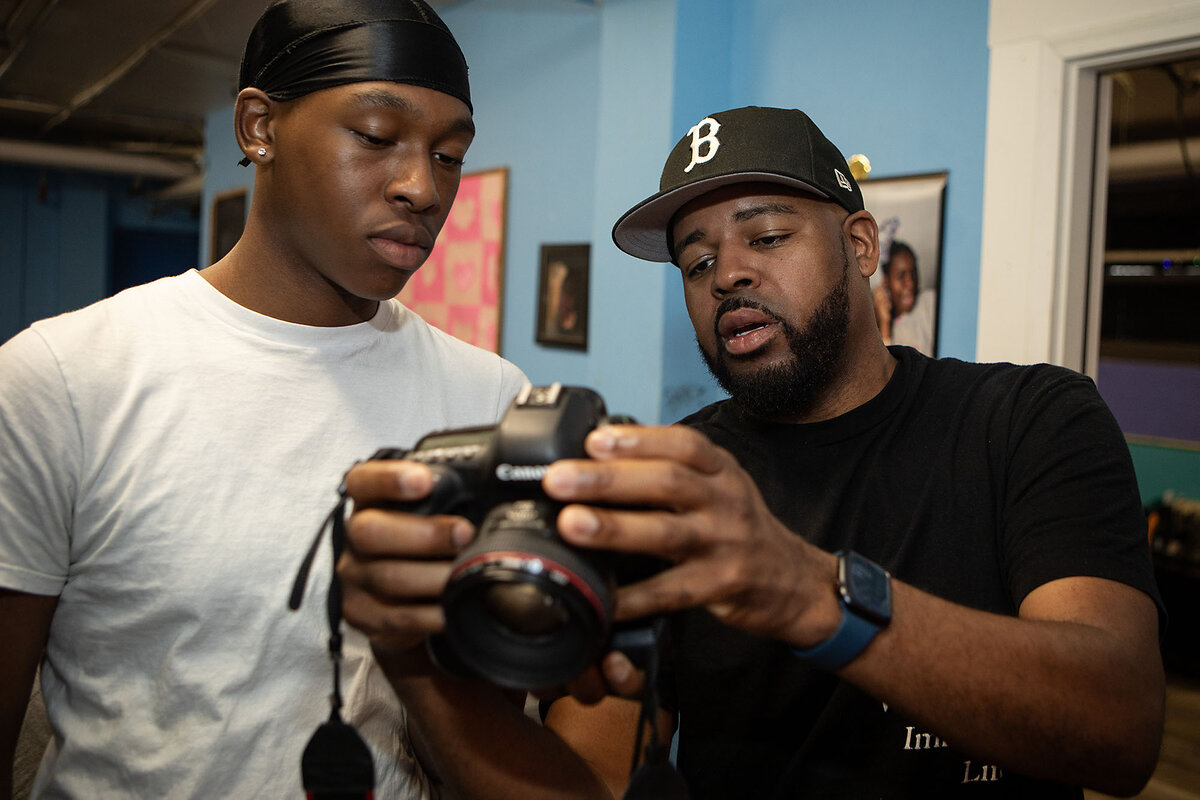
Allison Vernerey has been handling hundreds of applications a day. As executive director of the city’s Office of Youth Employment and Opportunity, she has also been meeting with families to place their youths in the right job.
The pandemic was especially tough for teens, says Ms. Vernerey. “I speak to a lot of the parents. ... There’s really this eagerness to in some way catch up and make sure that the youth are set up for success in the future. So we see that and we’re definitely seeing it in application trends, which are very, very high.”
Boston has promised that 100% of high schoolers who apply to the city’s summer employment program will be guaranteed a job. This year, the Office of Youth Employment and Opportunity reported a 15% increase in applicants, nearly 10,000 submissions. That’s slightly above pre-pandemic levels.
The benefits of a summer job can shape teens’ academic and social success in both the short and long term, according to a 10-year study conducted by Northeastern University on Boston’s teen summer employment programs.
In the short term, young people increase their aspirations to go to college, have higher GPAs, and less absenteeism in school, says Dr. Modestino. “Young people within the program are much more likely to say – on the order of ... upwards of 7 to 10 percentage points – more likely to say by the end of the summer that they want to go to a four-year college. A lot of that stems from the adult mentors that they get from working on the job, whether in the public or private sector.”
In the long term, the social-emotional skills developed on the job also reduce anxiety and conflict by training youths to deal with stressful situations. “We found that those soft skills – like managing emotions, resolving conflicts with a peer, and asking adults for help – those things are highly correlated with a reduction in criminal justice involvement. Young people in the program are 35% less likely to be involved in a violent crime and 29% less likely to be involved in a property crime,” says Dr. Modestino.
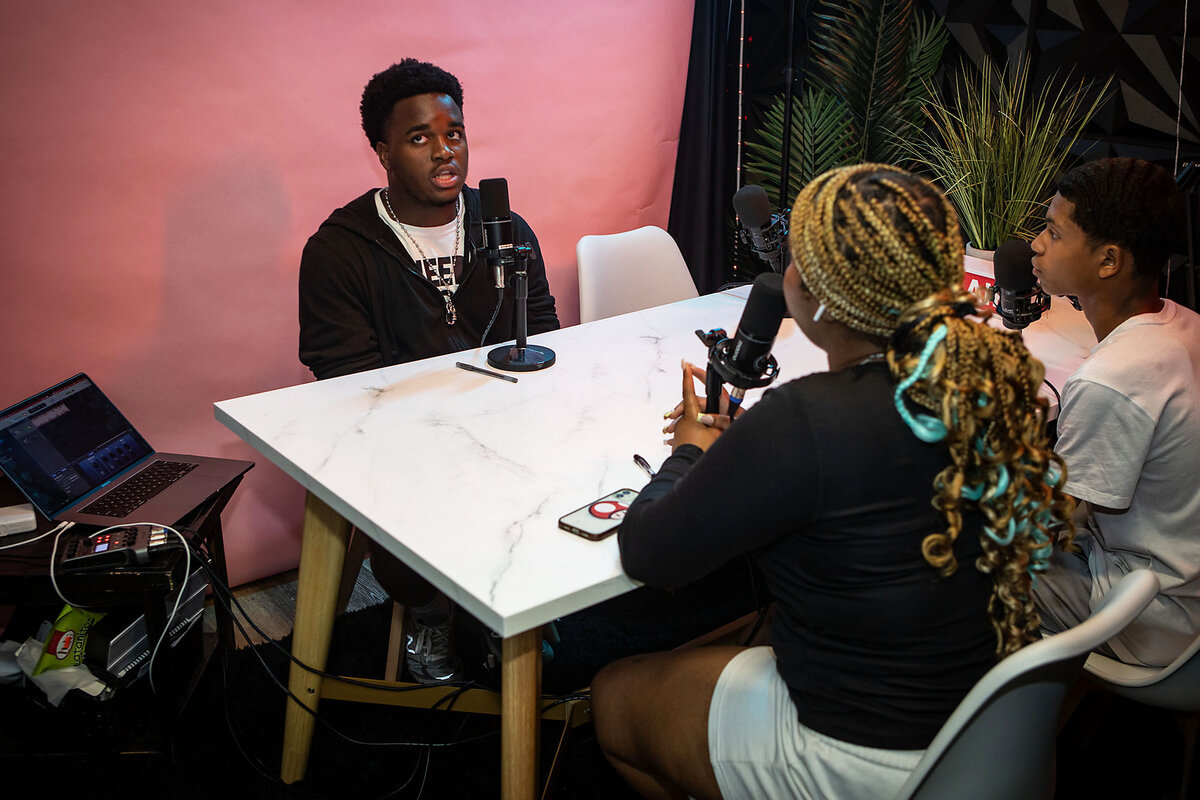
Learning financial literacy
The summer job is a rite of passage, and also most teens’ first introduction to earning money and how to manage it.
Thamel Thomas, 16, is a returning employee at the South Street Youth Center, where he’s learning how to use marketing strategies and multimedia production tools. After starting last summer, he stayed on through the school year. Now he’s a team manager, passing on skills to other teens.
“I got a summer job because ... I wanted to make money, but I also wanted to add experiences to my résumé. And especially with this job, you’re ... learning a whole bunch of skills,” says Thamel, who also works for SummerWorks, a citywide youth employment program.
He is thinking ahead to his future career – and also to the not-so-distant future. He pulls out the notes app on his iPhone and scrolls through a detailed list of budget items, with descriptions and dollar amounts.
“Basically, clothes ... savings, a bunch of things I need for the school year,” he explains. “Then, of course, I took into account food or entertainment or stuff like that.”
Other teen workers interviewed said their main focus was saving money, with goals ranging from 50% to 75% of their wages.
“Inflation is not only hitting employers’ labor costs. It’s also hitting teens’ pockets, as well as those of their families,” said Andrew Challenger, labor and workplace expert and senior vice president of Challenger, Gray & Christmas Inc.
The teens interviewed push back on the narrative – which has also been passed down through generations – that teenagers are lazy and don’t care about the future.
“Some employers are not sure if hiring youth is actually going to bring them value in terms of the work they do. However, what we see is actually completely the opposite. ... They are so powerful in terms of the mindset they bring to work and their ability to approach problems and think differently,” says Ms. Vernerey.

Planning for the future
Gwen Duda has already been working for years. She has been saving her wages since she was a babysitting tween, then a boutique employee. This summer, she’s working the front desk at the Parkway Community YMCA. As she readies for her first semester of college, she’s worried about inflation and the cost of tuition.
“I’m trying to put a lot of money away for college tuition. I’m going to UMass Amherst, which is exciting, and I’m trying to figure out how to save for that. And, yeah, I mean, it’s just like a lot to think about. College is so much more money now,” she says. “I think that like financial needs and what you have to prepare for financially is so much more on your mind when you’re younger now.”
“What I see is that more kids are getting jobs because parents aren’t always going to be able to buy the stuff they want, so teens want to be more independent,” says Jason Tackie, another camp counselor at the YMCA in West Roxbury.
Jason started working after his first year of high school to buy new shoes and basketball equipment. He didn’t expect to be learning new skills, gaining new mentors, or frankly, learning to have fun while working.
He says having a job has improved his time management in school, too. Jason wants to study nursing at a four-year college, something he said he has only realized recently.
“My favorite part also is, like, getting to learn new skills,” says Jason. “My supervisor for sports, Manny, actually taught me, like, a lot of new skills that will help me in the future. He’s made me a better leader for sure when it comes to being around kids. ... So, yeah, he’s played a big role in my life.”
“There’s a lot of stuff that I learned on the job that I didn’t know that I was going to learn,” he adds. “I feel like it motivates me every day to come here and make sure everyone’s having a good time. It’s helped me grow up a lot.”

Civil war drove them to Nigeria. Cameroonians say they feel at home.
A village near Nigeria’s border with Cameroon has opened its arms to refugees fleeing civil war in that country. Their experience offers a glimpse into how embracing refugees can have benefits for newcomers and locals alike.

- Quick Read
- Deep Read ( 5 Min. )
-
By Ogar Monday Contributor
In 2018, the Nigerian federal government and the United Nations approached the leaders of a village in southern Nigeria with a request. They wanted to use about 150 acres of the village’s land for a refugee settlement. It would house people fleeing from a civil war in neighboring Cameroon.
Adagom’s leaders didn’t hesitate. After all, the community knows what it means to need help. The village lies just minutes from Gakem, the site where the first shot of Nigeria’s devastating civil war rang out in 1967.
“We understand their plight,” says Edward Egbaji, head of the Adagom Clan. “We wanted them to feel as comfortable as possible.”
But leaders also knew opening their doors could have practical benefits. The settlement was not a refugee camp, but a kind of neighborhood on the edge of the village that people could move in and out of freely.
That meant that the influx of refugees would likely boost the village economy, and bring an infusion of humanitarian aid to local institutions like schools and clinics.
“We don’t see refugees and host communities here. There are only friends and teammates,” says Udam Loveday, a local resident.
Civil war drove them to Nigeria. Cameroonians say they feel at home.
Ndoh Cheng was asleep in his tent in the Adagom refugee settlement in Ogoja, Nigeria, when a soft knock on the doorframe suddenly roused him. When he came outside that morning in August 2019, he was greeted by a local teenage boy with a stack of yams balanced on his head.
The boy explained that his parents had sent him to give Mr. Cheng the tubers so he could participate in the town’s harvest festival.
For Mr. Cheng – who had fled a civil war in his home country of Cameroon the year before – the gesture remains etched in his memory. It was the moment he realized that Adagom was not just the place he had run to. It had become his home.
“This community has given me far more than I ever imagined,” he says.
Mr. Cheng and his family are among the approximately 60,000 Cameroonians who have taken refuge in Nigeria since civil war broke out in their country in 2017. Spurred by demands for independence by Cameroon’s English-speaking minority, that conflict has claimed at least 6,000 lives and displaced over 600,000 people.
Some 8,000 of them now live in Adagom, and the village has opened its arms to them.
“The community saw them as their brothers in need,” says Victor Ogar, a supervisor with the Cross River State Emergency Management Agency (SEMA), the local government agency tasked with integrating refugees.
The reasons for that welcome are part altruism, part practicality, pointing to how embracing refugees can have benefits for locals and new arrivals alike.
“C’est lui”
In August 2018, a year before the gift of the yams, Mr. Cheng was standing outside of his office in the Cameroonian city of Limbe. Suddenly, a truck of military police officers pulled up in front of him, and the men began leaping out of the car.
“Est-ce que c’est lui?” one barked. (Is he the one?)
Another soldier’s curt reply confirmed the outcome: “Oui, c’est lui.” (Yes, it’s him.)
Before Mr. Cheng even grasped what was happening, the men shoved him into the back of the truck and drove him to a military facility, where he was charged with providing information to the Ambazonians – an anglophone militant group fighting for Cameroon’s two English-speaking regions to break away from the mostly-francophone country.
That conflict has deep roots, stretching back to the end of World War I, when the German colony of Kamerun was handed off to the British and the French, who split it in two. Following independence in the 1960s, the two pieces became a single country again.
But the national government was always heavily dominated by French speakers, who the anglophone minority felt treated them as second-class citizens. In 2016, lawyers and teachers in the two anglophone regions took to the streets in protest of the appointment of French-speaking officials to their courts and schools. In response, the national government cracked down violently, deploying tanks and soldiers. The heavy-handed response reignited a long-standing secessionist movement, and fighting began.
In the years since, government forces have been accused of indiscriminate arrests and other human rights violations. Meanwhile, the “Amba Boys,” as the separatists are often called, have claimed responsibility for deadly attacks on civilians, including bombings of schools and sporting events.
Mr. Cheng says soldiers tortured him in an attempt to get him to say that he aided the separatists – but he never did. After a month in detention, he was released without charge. But he knew it wasn’t safe for him to stay in Cameroon.
So in September 2018, he boarded a ferry headed for Calabar, Nigeria, uncertainty gnawing at his heart.
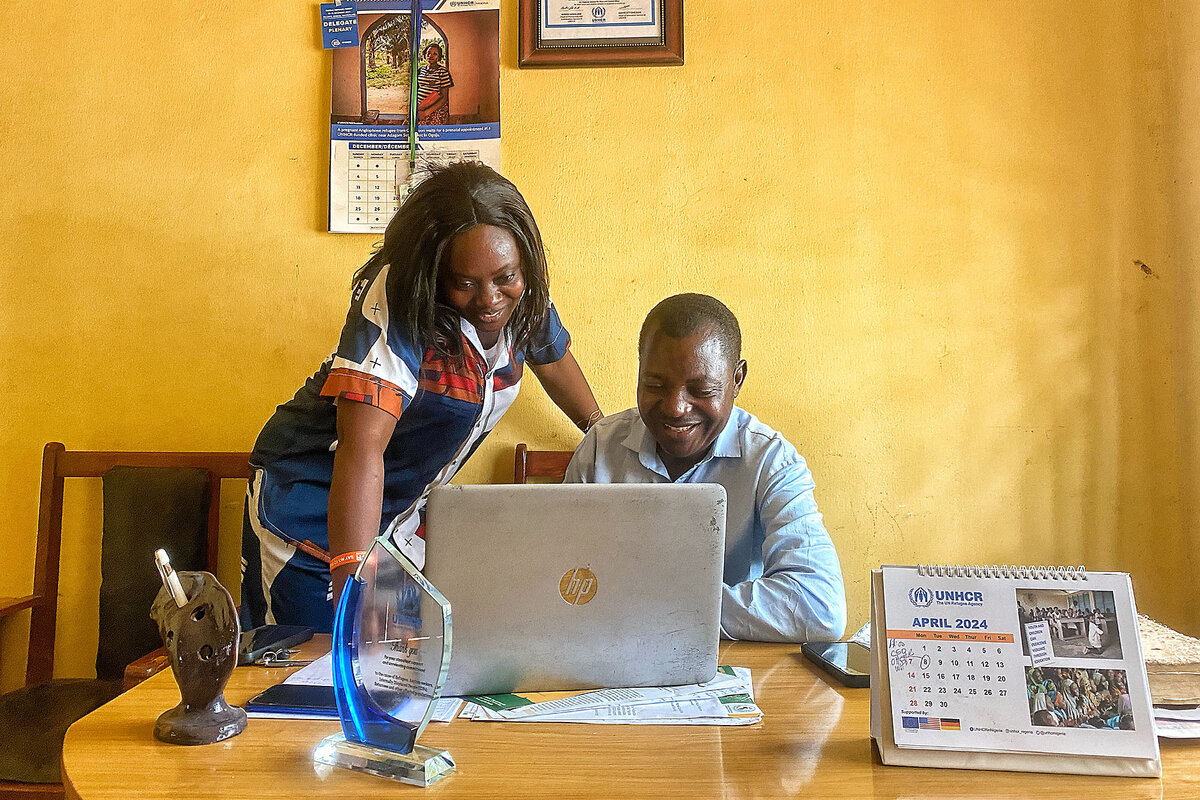
“Friends and teammates”
As it turned out, he had little to fear.
When Mr. Cheng arrived in Nigeria, he immediately took a bus to the city of Ogoja, 40 miles from the border. He had a friend living in the refugee settlement there, which UNHCR, the United Nations refugee agency, had set up in a village on the city’s outskirts called Adagom.
Earlier that year, the Nigerian federal government and UNHCR had approached Adagom’s community leaders with a request to use about 150 acres of their land for a refugee settlement.
The leaders didn’t hesitate. After all, the people of Adagom are no strangers to needing help. The village lies just minutes from Gakem, the site where the first shot of Nigeria’s devastating civil war rang out in 1967.
The community donated the land the government asked for, along with other parcels of unused farmland.
“We understand their plight,” says Edward Egbaji, head of the Adagom Clan. “We wanted them to feel as comfortable as possible.”
But leaders also knew opening their doors could have practical benefits. The settlement was not a refugee camp, but a kind of neighborhood on the edge of the village that people could move in and out of freely.
That meant that the influx of refugees would likely boost the village economy, and bring an infusion of humanitarian aid to local institutions like schools and clinics.
Cultural ties also played a role in the benevolence of the community, says Mr. Ogar, the government official working on refugee resettlement. He notes that many of the refugees belong to the Ejagham ethnic group – as do many people in Adagom and the surrounding areas.
“We don’t see refugees and host communities here. There are only friends and teammates,” says Udam Loveday, a local resident.

A sense of home
On a recent morning, as Mr. Cheng rode through Adagom on his bike, his neighbors greeted him in a mix of Nigerian and Cameroonian pidgin English.
Many conversations here – from customers haggling with vendors over fabric prices to men debating the latest English Premier League result – take place in a mix of the two languages.
These days, the tract of donated land Mr. Cheng farms produces so many vegetables that he has more than his family needs. He often gives the surplus away to his neighbors – refugees and locals alike.
He also runs a small charitable organization that works on social issues facing both refugees and locals. Sandra Ndok, a local who works for Mr. Cheng’s organization, says working with refugees has been the best experience of her life.
“I am planning on spending a year in Cameroon after the war ends, traveling across the region, eating their food and dancing to their music,” she says. “I need to live the stories I have heard from them.”

Points of Progress
Bullfighting bans, domestic violence protections
In our progress roundup, countries that have lagged behind others in their policies make changes to catch up. Colombia joins a wave of countries that have banned bullfighting and Kazakhstan strengthens protections against domestic violence.
Bullfighting bans, domestic violence protections

Movies and television are making more use of Asian languages as storytelling tools
Hollywood used to eschew foreign languages because of American audiences’ distaste for subtitles. But with 50% of viewers now preferring to watch content in any language with English captions, a growing pool of Asian and Asian American projects is using non-English dialogue to enrich world-building.
In older films, less attention was paid to accuracy and one Asian language served as well as another. Now, authenticity’s value has increased. When filmmaker Lulu Wang pitched her 2019 movie “The Farewell,” studio executives pressured her to translate the mostly Mandarin script into English. Yet her 2024 series “Expats” uses dialogue in Tagalog and Cantonese as its fifth episode focuses on Filipino domestic workers and everyday Hong Kong citizens.
In 2020, “Parasite,” which is in Korean, became the first foreign-language film to win best picture at the Oscars. “Everything Everywhere All at Once,” which mixes Cantonese, Mandarin, and English, won best picture in 2023.

Source: The New York Times
Colombia has banned bullfighting
A centuries-old tradition introduced during Spanish colonial rule, bullfighting has long been criticized by animal rights advocates as cruel and abusive. The animals are bred to be aggressive and are taunted during the bullfight before being killed.
While he was mayor of Bogotá, current President Gustavo Petro suspended bullfighting in the city in 2012, but the Constitutional Court’s recognition of bullfighting’s cultural value reversed that ban. Critics of the new national law passed by Congress say it will negatively impact the economies of several cities still holding bullfighting events, which draw thousands of spectators each year. Before the law takes full effect in 2028, the government is required to help workers in the industry find new employment.
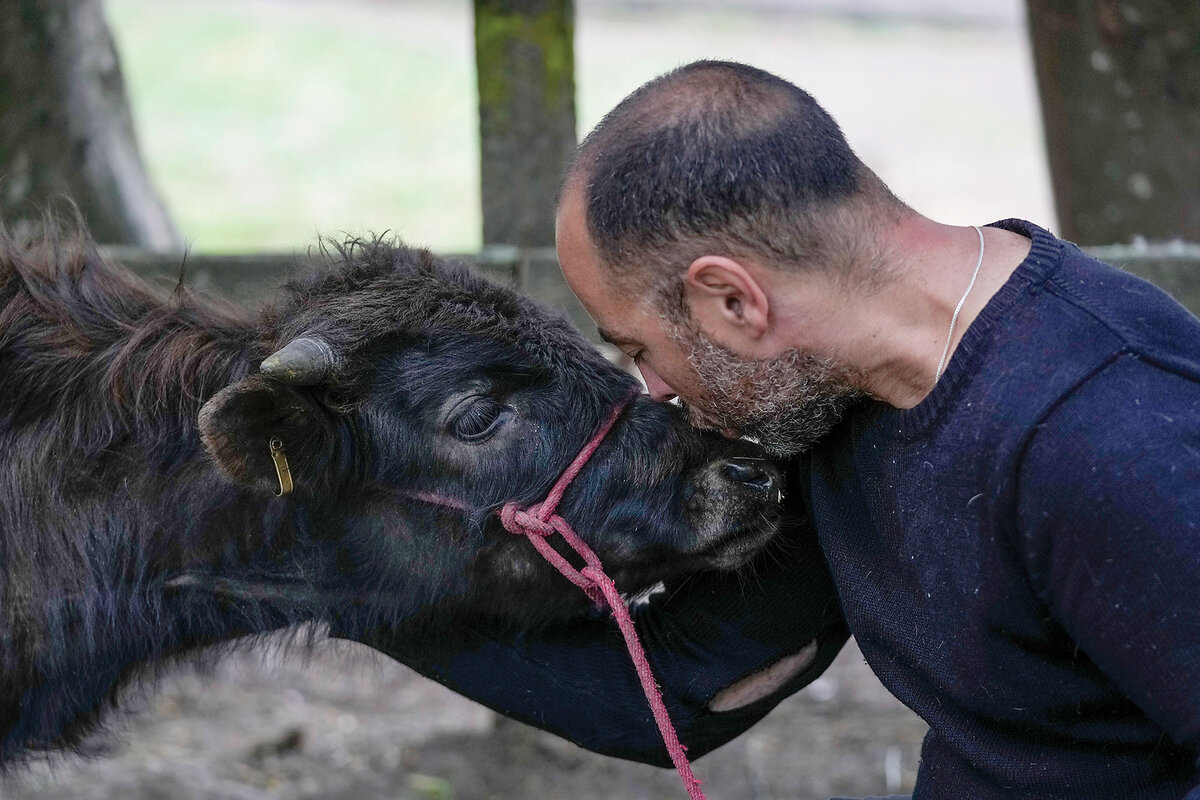
Colombia joins five other nations in Latin America that have outlawed the tradition.
Sources: The Associated Press, Al Jazeera
In a near-unanimous vote, Liechtenstein’s parliament legalized same-sex marriage
The microstate, which is about the size of Washington, D.C., is the last German-speaking country to grant same-sex marriage rights and joins 21 other European states.
Liechtenstein legalized civil unions in a 2011 referendum. While the country’s monarch had opposed adoption rights for same-sex couples, the government granted them last year.
Liechtenstein’s population is majority Catholic, and Catholicism is the official state religion. The country hosted its first Pride event in 2022.
Sources: Politico, Reuters
Group therapy led by lay counselors is helping to combat depression
In Zambia, only about 25 psychologists and psychiatrists serve a population of 20 million. StrongMinds, an international nonprofit, trains community members to lead groups for better mental health.
The program uses interpersonal group therapy, which has proved useful because it can be adapted to local cultures. Participants learn strategies to cope with depression triggers such as the death of a loved one. The program focuses on women, who face higher rates of depression than men do.
Since StrongMinds started in 2013 in Uganda, over 500,000 people have been treated. Former clients report benefits that extend beyond their own health: more work participation, increased food security, and higher school attendance by their children. “Depression treatment can be, what we call, democratized,” said founder Sean Mayberry. “You can take it out of the hands of doctors and nurses and give it to the community itself.” New extensions of StrongMinds are operating in Kenya and the United States.
Source: Reasons to Be Cheerful
New penalties increase protections against violence for Kazakhstan’s women and children
During the high-profile trial of a former Cabinet minister who was convicted in May of murdering his wife, international public pressure mounted for change. Among 70 amendments, the new laws passed in April recriminalize “battery” and “intentional infliction of light bodily harm” after criminal penalties for both offenses were abolished in 2017.

Almost 17% of women ages 18 to 75 report having experienced physical or sexual abuse by a partner, according to government data. Police are now required to collect evidence in cases of domestic violence, shifting the burden away from survivors. The law also imposes criminal liability for sexual harassment of people under 16, and imposes fines and warnings for the bullying and cyberbullying of children. The accused can no longer evade criminal responsibility by seeking reconciliation with survivors.
Human rights advocates say there is room for strengthening protections, including making domestic violence a standalone offense.
Sources: The Times of Central Asia, Human Rights Watch, The Astana Times

Other headline stories we’re watching
(Get live updates throughout the day.)The Monitor's View
Biden’s meekness sustains democracy
- Quick Read
- Deep Read ( 2 Min. )
-
By the Monitor's Editorial Board
President Joe Biden described his reason for ending his reelection run as simply being in the “interest of my party and the country.” Among Democrats, concerns had mounted over his ability to win as well as his mental acuity. Yet his decision ultimately reflects a deeper reason, one based on Mr. Biden’s understanding of where power lies in a democracy.
“The American story,” he said in his 2021 inaugural address, “depends not on any one of us, not on some of us, but on all of us.”
“Let us listen to one another,” he urged. “Hear one another. See one another. Show respect to one another.”
Mr. Biden’s humility – the kind that both sees and seeks the good in others – won the day, as is often the case in democracies compared to autocracies.
Humility, writes Christopher Beem, a political science professor at Penn State University, is an essential virtue of democracy – a disposition that yields to generosity for those with whom we disagree. “If we enter into the rough and tumble of politics knowing that none of us has a hammerlock on the truth,” he wrote, “we might be more likely to find it.”
Biden’s meekness sustains democracy

President Joe Biden described his reason for ending his reelection run as simply being in the “interest of my party and the country.” Among Democrats, concerns had mounted over his ability to win as well as his mental acuity. Yet his decision ultimately reflects a deeper reason, one based on Mr. Biden’s understanding of where power lies in a democracy.
“The American story,” he said in his 2021 inaugural address, “depends not on any one of us, not on some of us, but on all of us.”
“Let us listen to one another,” he urged. “Hear one another. See one another. Show respect to one another.”
Mr. Biden’s humility – the kind that both sees and seeks the good in others – won the day, as is often the case in democracies compared to autocracies. Mr. Biden’s withdrawal echoes the wise decision by President Lyndon Johnson to bow out of the 1968 race. Perhaps the greatest moment in U.S. history was George Washington’s decision not to seek a third term. As he told Americans in his farewell address, “The unity of government which constitutes you one people ... is a main pillar in the edifice of your real independence.” His example also set a critical norm for the world in the peaceful transfer of power from one political party to another.
In a much newer democracy, that of postapartheid South Africa, a very popular President Nelson Mandela left office in 1999 with an appeal to his people not to demand his return. “Don’t call me,” he said. “I’ll call you.”
Humility, writes Christopher Beem, a political science professor at Penn State University, is an essential virtue of democracy – a disposition that yields to generosity for those with whom we disagree. “If we enter into the rough and tumble of politics knowing that none of us has a hammerlock on the truth,” he wrote in The Conversation, “we might be more likely to find it.”
Mr. Biden began his political career more than 50 years ago as the youngest member of the U.S. Senate. He sought the presidency multiple times until winning it in 2020. Looking back, perhaps the best line in his inaugural address was in asking Americans to “turn to the tasks of our time ... devoted to one another.” Out of devotion to a cause greater than himself, the 46th U.S. president has now taken his own sage advice.

A Christian Science Perspective
Each weekday, the Monitor includes one clearly labeled religious article offering spiritual insight on contemporary issues, including the news. The publication – in its various forms – is produced for anyone who cares about the progress of the human endeavor around the world and seeks news reported with compassion, intelligence, and an essentially constructive lens. For many, that caring has religious roots. For many, it does not. The Monitor has always embraced both audiences. The Monitor is owned by a church – The First Church of Christ, Scientist, in Boston – whose founder was concerned with both the state of the world and the quality of available news.
Shake it off!
- Quick Read
- Read or Listen ( 3 Min. )
-
By Jan Keeler Vincent
We can look to Christ for the truth of our real nature as God’s children, and experience healing as a result.
Shake it off!
Hearing Taylor Swift’s popular song “Shake it off” makes me smile, because that phrase reminds me of an idea I have found helpful in my study and practice of Christian Science.
When Jesus was preparing his disciples to go to different villages to heal and to share their new understanding of God – who is eternal Life, intelligent Mind, and infinite Love – he counseled them, “When ye come into an house, salute it. And if the house be worthy, let your peace come upon it: but if it be not worthy, let your peace return to you. And whosoever shall not receive you, nor hear your words, when ye depart out of that house or city, shake off the dust of your feet” (Matthew 10:12-14).
I like to think of this as, “Don’t let rejection take away your peace. Just shake off the frustration, drop the disappointment right then and there, and move on.” It’s a message I’ve found helpful in my own life, too.
When we shake something off, we separate it from ourselves. What does it mean to separate ourselves from the dust?
The study of Christian Science has taught me that dust can represent matter – which is the supposed opposite of God, who is All and is incorruptible Spirit. The first chapter of Genesis explains that God made man in His likeness. This must mean that every one of His children – which includes all of us – is entirely spiritual, good, pure, just, flawless, and lovely in every sense of the word. Mary Baker Eddy, the discoverer of Christian Science, wrote, “Man originated not from dust, materially, but from Spirit, spiritually” (“Miscellaneous Writings 1883-1896,” p. 57).
So, we might think of “shaking the dust off our feet” as shaking off a material, stained, limited sense of ourselves or others.
It may feel impossible to let go of those unhelpful thoughts. Shaking off the dust can’t be done just through human will. Through prayer, however, we can gain a deeper understanding of the nature of the allness of God and our inseparable relationship to Him. Then we find release from illness, bitterness, hurts, and resentment as we realize that God is totally, 100% good. We are each embraced in His goodness and subjected only to His love.
Because there is only one Mind, God, inharmonious thoughts aren’t truly part of us. Christ – God’s forever message of truth about what He is and what we are as His children – enables us to recognize false beliefs about our nature for what they are, and to know the healing truth.
Recently I became ill with severe flu-like symptoms. That night, I prayed to let go of any material beliefs and fears that the harmony of my being as Spirit’s offspring, or idea, could be interrupted. Where in omnipresent God is there room for something harmful? The thought came to me, “You don’t have to believe this. You can shake this off!”
That didn’t mean waiting out or willing away the illness. It was a call to recognize that what the physical senses report is not the fundamental truth of what we are – and to insist on the totality of God and His goodness. We have all been given divine authority to do this.
By the next morning, all symptoms were gone.
The inward voice of Christ, Truth, speaks to us all, reassuring us of our God-given peace and health. Christ calms, comforts, and neutralizes negatively charged thinking. Christ enables us to have a sense of inner poise, dignity, and dominion over discord – whether it be relationship issues, anxiety, depression, disease, or something else.
The Bible tells us of a time when a poisonous viper came out of the fire and attached itself to the Apostle Paul’s hand. What did he do? He shook it off, and was not harmed.
That’s what we can learn to do when toxic thoughts try to attach themselves to us: through the help of the ever-active Christ, we can “shake it off” – hold to the truth of our real nature as spiritual and whole, and let our peace return to us.

Viewfinder
A signature look

A look ahead
Thank you for joining us today. Please come back tomorrow as we continue to look at the consequences of President Joe Biden pulling out of this autumn’s election. Among the stories we’re following: Did the Democrats just invalidate the choice of their primary voters? And as attention focuses on Vice President Kamala Harris, what more should voters know about her?


